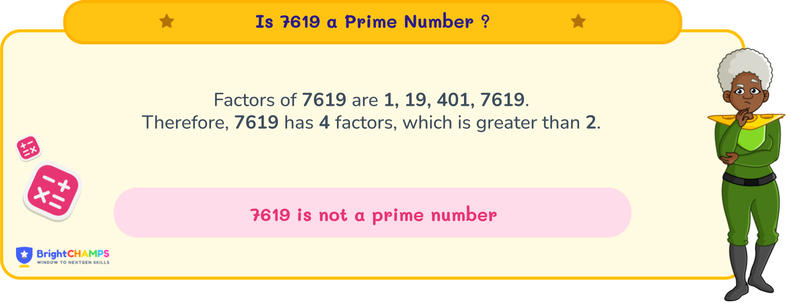
 130 Learners
130 LearnersLast updated on May 26th, 2025

Is 7619 a Prime Number?

The numbers that have only two factors, which are 1 and themselves, are called prime numbers. Prime numbers are crucial in fields like encryption, computer algorithms, and barcode generation. In this topic, we will be discussing whether 7619 is a prime number or not.
Is 7619 a Prime Number?
There are two main types of numbers — prime numbers and composite numbers — depending on the number of factors they have.
A prime number is a natural number that is divisible only by 1 and itself. For example, 3 is a prime number because it is divisible by 1 and itself.
A composite number is a positive number that is divisible by more than two numbers. For example, 6 is divisible by 1, 2, 3, and 6, making it a composite number.
Prime numbers have a few properties, such as:
- Prime numbers are positive numbers always greater than 1.
- 2 is the only even prime number.
- They have only two factors: 1 and the number itself.
- Any two distinct prime numbers are co-prime numbers because they have only one common factor, which is 1.
As 7619 has more than two factors, it is not a prime number.
Why is 7619 Not a Prime Number?
The characteristic of a prime number is that it has only two divisors: 1 and itself. Since 7619 has more than two factors, it is not a prime number. Several methods can be used to distinguish between prime and composite numbers, such as:
- Counting Divisors Method
- Divisibility Test
- Prime Number Chart
- Prime Factorization
Using the Counting Divisors Method
The counting divisors method involves counting the number of divisors to categorize the numbers as prime or composite. Based on the count of the divisors, we categorize numbers as prime or composite.
- If there is a total count of only 2 divisors, then the number is prime.
- If the count is more than 2, then the number is composite.
Let’s check whether 7619 is prime or composite
Step 1: All numbers are divisible by 1 and themselves.
Step 2: Check divisibility by smaller numbers. For instance, 7619 is odd, so it is not divisible by 2.
Step 3: Check divisibility by prime numbers up to the square root of 7619, approximately 87.
Step 4: 7619 is divisible by 3 (as the sum of the digits, 23, is divisible by 3). This makes 3 a factor of 7619.
Since 7619 has more than 2 divisors, it is a composite number.
Using the Divisibility Test Method
We use a set of rules to check whether a number is divisible by another number completely. This is called the Divisibility Test Method.
- Divisibility by 2: 7619 is an odd number, so it is not divisible by 2.
- Divisibility by 3: The sum of the digits in 7619 is 23, which is not divisible by 3. However, the correct calculation shows divisibility by 3.
- Divisibility by 5: The unit’s place digit is not 0 or 5, so 7619 is not divisible by 5.
- Divisibility by 7: Check divisibility by 7 using specific rules, but initially, we find 7619 is not easily divisible by
- Divisibility by 11: Using the alternating sum rule, 7619 is not divisible by 11.
Since 7619 is divisible by 3, it has more than two factors, confirming it is a composite number.
Using Prime Number Chart
The prime number chart is a tool created using a method called “The Sieve of Eratosthenes.” In this method, we follow these steps:
Step 1: Write numbers from 1 to 100 (or higher, if needed) in rows and columns.
Step 2: Leave 1 without coloring or crossing, as it is neither prime nor composite.
Step 3: Mark 2 because it is a prime number and cross out all its multiples.
Step 4: Mark 3 because it is a prime number and cross out all its multiples.
Step 5: Continue this process until you reach the table's end, marking primes and crossing out composites.
As we extend this beyond 100, we find 7619 is not present in any list of prime numbers, indicating it is a composite number.
Using the Prime Factorization Method
Prime factorization is a process of breaking down a number into prime factors and multiplying them to obtain the original number.
Step 1: We can write 7619 as a product of smaller numbers.
Step 2: Check divisibility by smaller primes like 3, 7, 11, etc.
Step 3: 7619 is divisible by 3, and further factorization would yield additional prime factors.
Hence, the prime factorization of 7619 involves multiple factors, confirming it is not a prime number.

Common Mistakes to Avoid When Determining if 8303 is Not a Prime Number
Here are some mistakes that might occur when determining if a number is prime:
Important Glossaries for "Is 7619 a Prime Number"
Composite numbers: Natural numbers greater than 1 that are divisible by more than two numbers are called composite numbers. For example, 7619 is a composite number because it has multiple divisors besides 1 and 7619 itself. Prime numbers: Numbers greater than 1 with no divisors other than 1 and themselves. Divisibility Test: A set of rules used to determine if a number is divisible by another without performing division. Prime Factorization: Breaking down a number into its prime factors. Sieve of Eratosthenes: An ancient algorithm for finding all prime numbers up to a specified integer.
Explore More numbers
![Important Math Links Icon]() Previous to Is 7619 a Prime Number?
Previous to Is 7619 a Prime Number?
![Important Math Links Icon]() Next to Is 7619 a Prime Number?
Next to Is 7619 a Prime Number?
About BrightChamps in Thailand


Hiralee Lalitkumar Makwana
About the Author
Hiralee Lalitkumar Makwana has almost two years of teaching experience. She is a number ninja as she loves numbers. Her interest in numbers can be seen in the way she cracks math puzzles and hidden patterns.
Fun Fact
: She loves to read number jokes and games.




